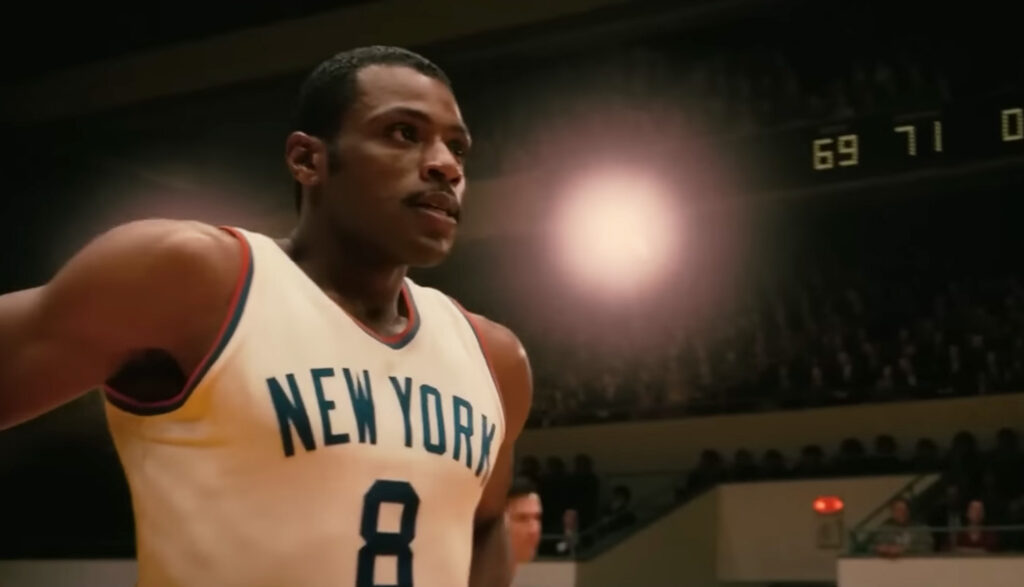
It’s 1949, and Nat “Sweetwater” Clifton plays for the Harlem Globetrotters against the current NBA champions Minneapolis Lakers. The game’s a close one—somewhat surprising, since the Globetrotters aren’t even an NBA team. Before the buzzer sounds, Sweetwater slams the ball through the basket, and the Lakers are defeated, 49 to 45.
It’s evidence enough for New York Knickerbockers Coach Joe Lapchick, who is convinced that Sweetwater would be a great addition to his team. But there’s one problem. There aren’t any Black players in the NBA.
“It’s not gonna be like that forever,” Joe tells Sweetwater. “I think that you can help make the change. You can be the first.”
But not everyone at the NBA’s league offices is keen on the idea. In fact, some of those at the top are so opposed to it that they change the NBA bylaws to prevent Black players from being allowed on the court. And that means Sweetwater is stuck being underpaid on the Globetrotters.
But Sweetwater’s used to the discrimination, and, along with Joe, he won’t give up easily.
Together, they just might make history.
Many characters stand up against racist discrimination in this real-life story. Some do so for selfish gain. But others stand against racism because they know it is wrong. Joe, for instance, adamantly opposes the NBA’s restriction on Black players. And when Joe’s son uses the n-word (apparently unaware of its significance), Joe firmly and immediately tells his son that it’s “a word of disrespect, never to be used.”
The story also exposes the inconsistency—and, we might even say stupidity—of some who embrace racism one moment, then discard it the next for self-centered reasons. A man refuses to sell gas to Sweetwater, for example. But when he learns that Sweetwater is famous, he asks for a signature.
A hotel clerk refuses vacant rooms to the team whilst allowing a trainer and his pet a room. And when the clerk says that he’s just following rules, the Globetrotters’ coach compares his response to that of the Nazis: “You don’t make the rules. You just follow them, like at Nuremburg.” Moments like these illustrate how simultaneously dehumanizing and ridiculous racial prejudice is.
Sweetwater’s mother tells him to use the hands that God gave him for a good use. An announcer describes a turnaround as “if the basketball gods have flipped the switch.”
Sweetwater is seen shirtless, and a woman’s dress reveals a bit of cleavage. A woman kisses Sweetwater on the cheek.
A man hits Sweetwater with a metal pipe, and someone stomps on the Knickerbockers’ owner’s finger to try to dissuade Sweetwater from playing.
Sweetwater punches an attacker. Another man threatens to shoot him for attempting to purchase gas, though the tense situation eventually passes. Sweetwater gets shoved to the ground during a game.
The n-word is used twice. We also hear “h—” and “d–n” used a number of times, and “a–,” “b–ch” and “crap” are all used three times or less. God’s name is abused once.
Many characters smoke cigars. People drink alcohol.
Many individuals racially discriminate against Sweetwater and his Black teammates: a man forcefully prevents Sweetwater from buying gas; a hotel clerk refuses rooms to the team, forcing them to sleep in their bus; a losing white team gets paid more money than the Globetrotters’ winning Black team. We also hear a Jewish man reference another person’s anti-Semitic decision.
When team owners discuss NBA bylaws, they debate banning Black players. They argue that it’s because Black players have too much “unnecessary razzle-dazzle,” but it’s clear their viewpoint stems from racist inclinations.
Someone thanks a man for allowing them to sleep in the “urine-soaked alleyway.”
In 1950, Nat “Sweetwater” Clifton became the first African American man to sign a contract with the NBA. But that historic moment wasn’t without its difficulties.
Opponents of integration made threats. Some feared reprisal against Sweetwater and his team. Many within the NBA would’ve preferred that Sweetwater stayed out. But he refused to be benched, and it wasn’t long before he, along with Earl Lloyd and Chuck Cooper, broke the color barrier to make history.
This film captures some of the difficulties the three faced. We witness racial discrimination that occasionally turns violent and hear a couple of n-words (as well as some other other language). But for every negative moment, there’s also a positive one, such as when Joe rebukes his son for using the n-word and when a couple of characters turn from being apathetic to supporting Sweetwater’s endeavor.
Sweetwater has a couple moments that may make it hard for younger viewers to watch. But overall, this biopic tells a compelling story of one man’s struggle in the push toward equality and to overcome racial roadblocks in his way. The movie can be used to show the hypocrisy of racism and can lead parents into a conversation with their children about why it’s morally wrong.
That’s certainly worth a few points.


Kennedy Unthank studied journalism at the University of Missouri. He knew he wanted to write for a living when he won a contest for “best fantasy story” while in the 4th grade. What he didn’t know at the time, however, was that he was the only person to submit a story. Regardless, the seed was planted. Kennedy collects and plays board games in his free time, and he loves to talk about biblical apologetics. He thinks the ending of Lost “wasn’t that bad.”